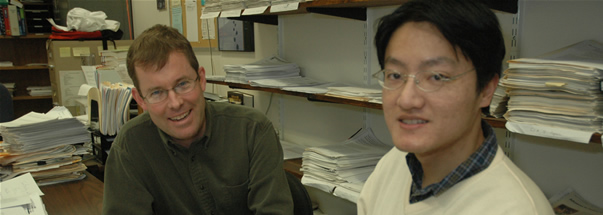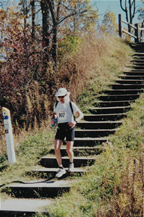Running on Motivation
Mastering chemistry is like running a marathon. In the mountains. With a weak heart.
February 12, 2007
By Russ Hudson
Chemistry professor Scott Hewitt doesn’t want his students to get discouraged in mid-semester. Chemistry is a difficult topic and, for some students, the material hasn’t come together yet. That is the time when new-semester enthusiasm is wearing thin and the energizing effects of imminent final exams hasn’t kicked in.
“I want them to do well. If they quit on it in midsemester, they can’t recover, so I try to keep them going until they begin to succeed and to see success,” Hewitt says.
How does he do it? He talks about infirmities.
“They come in to class one day and there is a list of infirmities on the board,” explains Hewitt. Mitral valve prolapse [a leaky heart valve], asthma, hereditary fructose intolerance, hypoglycemia [the need to eat frequent snacks to maintain proper blood sugar levels], a past serious knee injury, a past serious back injury and over pronation [the foot rotates too far when shifting weight during a stride]. “I ask them, can this person be a mountain ultrarunner? Of course, they say no.
“I tell them, that person is me. I tell them I never thought I would be able to run a marathon, that I was told by a doctor that I would never run again,” Hewitt says. “They know I do ultraruns [distances longer than marathons] in the mountains on a regular basis.”
Hewitt’s talk on those days often evokes emotion not only from students, but his own emotions, as well. There can be tears, expressions of pride and renewed determination, he says.
The message is clear: If those obstacles can be overcome to the point of ultraruns through the mountains, then the students can overcome their barriers to learning chemistry. Hewitt doesn’t just talk the talk, he runs the run, so when he says, “You can do this,” he means they should know they can do this. “I always tell them that we have no idea what our true potential is.”
The professor tops it off by giving students a chance to go on hikes with him. Even there, he acts as their safety net. “I always take extra food, an extra jacket and extra hiking equipment, in case someone forgets theirs,” says Hewitt. “I want them to enjoy the experience and gain an appreciation of nature. One student told me that taking a class from me was like hiking up a mountain … you put in a lot of effort and struggle on the way up, but, once you’ve reached the top, it feels great, and what at view!”
To Hewitt, it’s all part of a package. “I feel one of my functions as an educator is to be a motivator, not just a teacher. I think it’s safe to say most of my students consider me a tough instructor. This is one of the methods I use to help them reach the high standards I set for them while maintaining student satisfaction, which I think is necessary for student learning.”


